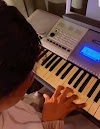### I Know He Will Damage His Piano
John had always been fascinated by music. His favorite hobby was tinkering with his new piano, a beautiful instrument that his parents had gifted him for his birthday. Every evening, he would spend hours playing and exploring new melodies. However, despite his passion, I knew he was heading towards a disaster.
John’s enthusiasm was unmatched, but so were his careless habits. He left the piano uncovered, exposing it to dust and moisture. Drinks and snacks frequently found their way onto the keyboard, leaving sticky residues and crumbs between the keys. His pets often roamed freely around the piano, and more than once, I saw his cat lounging atop it. He rarely tuned it, thinking it would always sound perfect as it did the first day.
Despite my gentle reminders, John continued his neglectful ways, convinced that his piano would last forever. But the truth is, his carelessness was setting the stage for inevitable damage.
### Bad Piano and Keyboard Maintenance Habits
John’s story is all too common among piano owners. Poor maintenance habits can severely shorten the lifespan of a piano or keyboard. Some of the most damaging practices include:
- **Exposure to Dust and Moisture**: Leaving a piano uncovered allows dust to accumulate in the strings and hammers, while moisture can warp the wood and rust the metal components.
- **Eating and Drinking Nearby**: Spills and crumbs can cause sticky keys and internal damage.
- **Infrequent Tuning**: Pianos need regular tuning to maintain sound quality and structural integrity. Neglecting this can lead to more significant issues over time.
- **Improper Environment**: Extreme temperatures and humidity levels can warp wood and detune strings.
- **Physical Mishandling**: Rough playing and improper moving can damage internal mechanisms.
### Expected Lifespan of a Piano or Keyboard
With proper care, an acoustic piano can last between 40 to 50 years, and sometimes even longer. High-quality grand pianos can serve for up to a century. Digital keyboards, on the other hand, typically have a lifespan of around 20 to 30 years, depending on usage and maintenance.
### Good Habits for Preserving a Piano or Keyboard
To ensure your piano or keyboard stands the test of time, it’s essential to adopt good maintenance habits:
- **Regular Cleaning**: Dust the surface regularly and use a slightly damp cloth to wipe down keys. Ensure no liquid seeps between the keys.
- **Covering the Piano**: Use a piano cover to protect it from dust and moisture when not in use.
- **Controlled Environment**: Keep your piano in a room with stable temperature and humidity levels. Use a dehumidifier or humidifier if necessary.
- **No Food or Drinks Nearby**: Avoid eating or drinking near the piano to prevent accidental spills.
- **Routine Tuning and Servicing**: Have your piano tuned at least twice a year by a professional. Regular servicing can catch potential issues early.
- **Proper Handling**: Move the piano carefully and avoid placing heavy objects on it.
### Encourage Proper Maintenance
Maintaining a piano or keyboard is not just about preserving an instrument; it’s about respecting the music and the joy it brings into your life. Encourage others to take proper care of their pianos by sharing these tips. Start by sharing this post with five groups you’re part of. Let's ensure that everyone who loves music can enjoy it for many years to come.










0 Comments